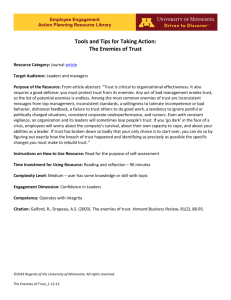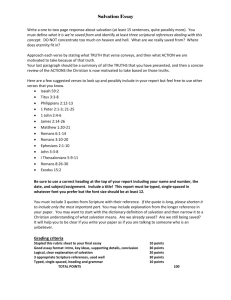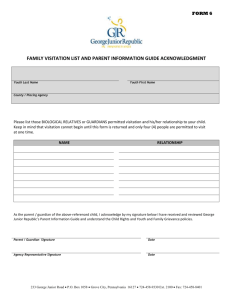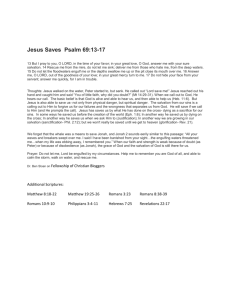see the wonderful construction of our bible
advertisement
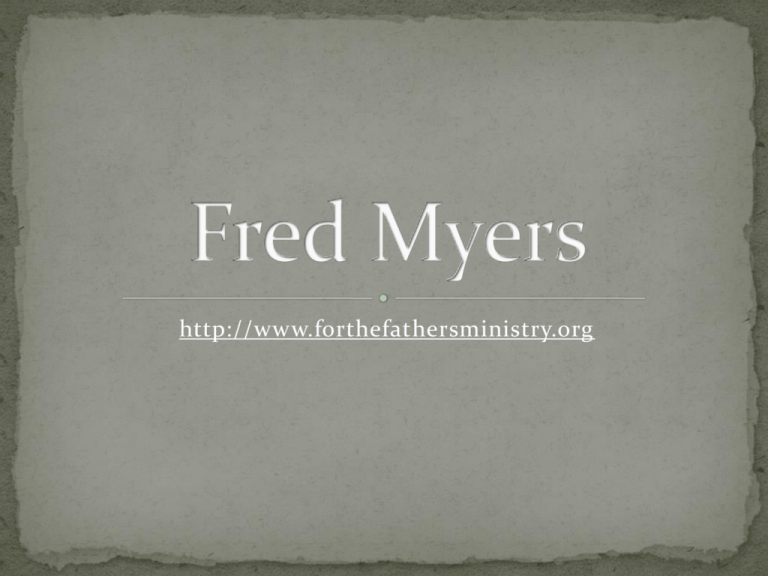
http://www.forthefathersministry.org A chiasm (ky'-az-um) represents a writing style that – once understood – clarifies, emphasizes and reveals deeper meaning in the Scriptures than is revealed in just a surface reading of these same verses. A chiasm is a literary style that some call the “chiastic (ky'-az-tic) approach” and others call the “chiastic structure.” Many who have read the Bible have never heard of this, yet it was identified over two hundred years ago. Once you understand how the chiastic structure works, it can dramatically enhance your understanding of those verses in the New and Old Testament where chiasms appear. A. 68. Visitation. B. 69. Salvation. C. 70. Prophets. D. 71. Enemies. E. 72. The Covenant. E. 73. The Oath. D. 74, 75. Enemies. C. 76. Prophet. B. 77. Salvation. A. 78, 79. Visitation. This presentation attempts to add to the general understanding of the chiastic approach, namely that the center point of a chiasm can often be applied for a better understanding of scripture. It is my hope that each of us will come to a new level of understanding with regard to Bible study. We can study how to recognize these chiastic patterns for ourselves so that as we read other books of the Bible, the Lord can speak to us in a new way. Oh the joy of discovering God's word for today! In order to discover the structure of a particular passage it is necessary that we begin to read the portion of Scripture very carefully, and note the subject. We mark it A. We read on until the subject changes, and we note and indent it thus B. When we come to the next change we may find either a third subject, in which case we must further indent it and mark it C., or, we shall find the first subject again and we would mark it A. If it is a repetition of the second subject, then we know that it is going to be an Introversion, and must mark it B. and place it under the B. Let us take, as a working example, "The Prophecy of Zacharias," in Luke 1:68-79; this being a passage of Scripture complete in itself, and not a human or arbitrary division. Zechariah’s Prophecy (Luke 1-68-79) And his father Zechariah was filled with the Holy Spirit and prophesied, saying, 68 “Blessed be the Lord God of Israel, for he has visited and redeemed his people 69 and has raised up a horn of salvation for us in the house of his servant David, 70 as he spoke by the mouth of his holy prophets from of old, 71 that we should be saved from our enemies and from the hand of all who hate us; 72 to show the mercy promised to our fathers and to remember his holy covenant, 73 the oath that he swore to our father Abraham, to grant us 74 that we, being delivered from the hand of our enemies, might serve him without fear, 75 in holiness and righteousness before him all our days. 76 And you, child, will be called the prophet of the Most High; for you will go before the Lord to prepare his ways, 77 to give knowledge of salvation to his people in the forgiveness of their sins, 78 because of the tender mercy of our God, whereby the sunrise shall visit us from on high 79 to give light to those who sit in darkness and in the shadow of death, to guide our feet into the way of peace.” 80 And the child grew and became strong in spirit, and he was in the wilderness until the day of his public appearance to Israel. The Holy Bible : English standard version. 2001 (Lk 1:67–80). Wheaton: Standard Bible Society. 67 Verse Introversion We read verse 68 with the object of finding and noting its subjects:—"Blessed be the Lord God of Israel; for he hath visited and redeemed his people." Here, the subject may be either "Visited" or "Redeemed." So we give the place of honor to the former of these two words, and write it down, thus:— A. 68. Visitation. A. 68. Visitation. Verse Introversion We then read the next verse, "And hath raised up a horn of salvation for us in the house of his servant David." Here there can be no doubt that the subject is Salvation. This we must mark "B," and set it down, indented, thus: B. 69. Salvation. A. 68. Visitation. B. 69. Salvation . Verse Introversion So far all is clear. But we know not, as yet, what the subject of the third member is to be. If it is Visitation we must set it down under "A" and mark it with an italic "A." Then we read slowly on:—"As he spoke by the mouth of his holy prophets, which have been since the world began." It is manifest that we have, as yet, no repetition of either of the subjects in "A" or "B." If it had been that of "A," it would be a Simple or Repeated Alternation. If it had been that of "B," we should know that it was going to be an Introversion. But, it is a fresh subject, which is clearly, "Prophets." So we must mark it "C," and write it down, indenting it still more, thus: C. 70. Prophets. A. 68. Visitation. B. 69. Salvation. C. 70. Prophets. Verse Introversion Even now, there is nothing to tell us what the Structure is going to be. So far as we can see, it may be an Extended Alternation by the repetition of "A," "B," and "C"; or it may be an Introversion to be marked "C," "B," and "A." So we must read on:—"That we should be saved from our enemies, and from the hand of all that hate us." Here, we still have no Repetition: but we find a new subject, which is clearly "Enemies." So we must mark it "D," and write down (still further indenting it) thus: D. 71. Enemies. A. 68. Visitation. B. 69. Salvation. C. 70. Prophets. D. 71. Enemies. Verse Introversion If the subject is a Repetition of any of the above subjects, we know that we are going to have an Alternation of some kind, or an Introversion. So we must still read on:—"To perform the mercy promised to our fathers, and to remember his holy covenant." Here, there can be no doubt that we have again a new subject, and that it must be Covenant. So we put it down, as before, and still further indent it, thus: E. 72. The Covenant. A. 68. Visitation. B. 69. Salvation. C. 70. Prophets. D. 71. Enemies. E. 72. The Covenant. Verse Introversion So we must still read on, closely scanning every word, in order to get the clue. We find it in the next verse (v 73):—"The oath which he swore to our father Abraham." Here, at length, we get one of our subjects repeated, as we were bound to do before long. It is the subject of "E," where the word "Covenant" is repeated in the synonymous word "Oath," thus indicating the sureness and certainty of the Covenant. We must mark this "E," and write it down under the "E," thus: E. 73. The Oath. A. 68. Visitation. B. 69. Salvation. C. 70. Prophets. D. 71. Enemies. E. 72. The Covenant. E. 73. The Oath. Verse Introversion that we, being delivered from the hand of our enemies, might serve him without fear, 75 in holiness and righteousness before him all our days 74 A. 68. Visitation. B. 69. Salvation. C. 70. Prophets. D. 71. Enemies. E. 72. The Covenant. E. 73. The Oath. D. 74, 75. Enemies. Verse Introversion 76 And you, child, will be called the prophet of the Most High; for you will go before the Lord to prepare his ways, A. 68. Visitation. B. 69. Salvation. C. 70. Prophets. D. 71. Enemies. E. 72. The Covenant. E. 73. The Oath. D. 74, 75. Enemies. C. 76. Prophet. Verse 77 to give knowledge of salvation to his people in the forgiveness of their sins, for you will go before the Lord to prepare his ways, Introversion A. 68. Visitation. B. 69. Salvation. C. 70. Prophets. D. 71. Enemies. E. 72. The Covenant. E. 73. The Oath. D. 74, 75. Enemies. C. 76. Prophet. B. 77. Salvation. Verse 78 because of the tender mercy of our God, whereby the sunrise shall visit us from on high 79 to give light to those who sit in darkness and in the shadow of death, to guide our feet into the way of peace.” for you will go before the Lord to prepare his ways, Introversion A. 68. Visitation. B. 69. Salvation. C. 70. Prophets. D. 71. Enemies. E. 72. The Covenant. E. 73. The Oath. D. 74, 75. Enemies. C. 76. Prophet. B. 77. Salvation. A. 78, 79. Visitation. A. 68. Visitation. B. 69. Salvation. C. 70. Prophets. D. 71. Enemies. E. 72. The Covenant. E. 73. The Oath. D. 74, 75. Enemies. C. 76. Prophet. B. 77. Salvation. A. 78, 79. Visitation. Here the center point of scripture is not what it would seem on the surface. One would think that it is Zechariah’s prophecy of his son being born a prophet and one who would prepare the way for the Lord. We can see by the chiastic structure that God is revealing much more. One must remember that God’s plan for the ages is the center point of all scripture and we see it here. God is keeping His covenant not only from the time of Abraham, but from Genesis 3.15, where He promises a redeemer. God’s son redeeming and judging is the center point of the Bible, and this is a wonderful verse highlighting this promise. Proverbs2 2 My son, if you receive my words and treasure up my commandments with you, 2 making your ear attentive to wisdom and inclining your heart to understanding; 3 yes, if you call out for insight and raise your voice for understanding, 4 if you seek it like silver and search for it as for hidden treasures, 5 then you will understand the fear of the Lord and find the knowledge of God. Daniel 12.4 But you, Daniel, shut up the words and seal the book, until the time of the end. Many shall run to and fro, and knowledge shall increase.” The Bible tells us that knowledge will increase in the end times and this includes Biblical knowledge. Throughout the Bible there is a pattern where God progressively reveals more of His plan for the ages. Using this chiastic style in writing is a Jewish tradition, but many Jewish traditions have been lost as the Protestant and Catholic faiths persecuted and separated from the Jewish people even though Paul warned us of this error. Biblical Wisdom is a body of knowledge, (the Bible), and experience, (Life); that demonstrates the ability to comprehend accurately with a deep understanding, all of God’s word; empowering one to act with care and thought for the future with the capacity for faith and forgiveness by grace and mercy. To receive Biblical wisdom James tells us in James 1.5 If any of you lacks wisdom, let him ask God, who gives generously to all without reproach, and it will be given him. The Resurrection of Christ 1Corinthians 15.1 Now I would remind you, brothers, of the gospel I preached to you, which you received, in which you stand, 2 and by which you are being saved, if you hold fast to the word I preached to you—unless you believed in vain. 3 For I delivered to you as of first importance what I also received: that Christ died for our sins in accordance with the Scriptures, 4 that he was buried, that he was raised on the third day in accordance with the Scriptures, Romans 4.22 That is why his faith was “counted to him as righteousness.” 23 But the words “it was counted to him” were not written for his sake alone, 24 but for ours also. It will be counted to us who believe in him who raised from the dead Jesus our Lord, 25 who was delivered up for our trespasses and raised for our justification. Romans 5.1 Therefore, since we have been justified by faith, we have peace with God through our Lord Jesus Christ. Romans14.11 for it is written, As I live, says the Lord, every knee shall bow to me, and every tongue shall confess to God.”12 So then each of us will give an account of himself to God. Go to the website http://www.forthefathersministry.org and you will find in the Bible Study section a six page booklet on receiving Christ as your Lord and Savior. It is my prayer that if have you not done so you will make that decision soon.

